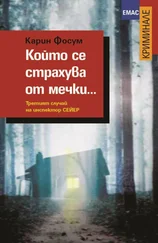She was overcome by waves of angst and then struggled to breathe. Eddie drank from his Coke bottle and looked out at the scenery; everything was shiny and nice in the golden spring sunshine.
“The crocuses will be out soon,” he said happily. “And the tulips. You’ll have plenty to do.”
Mass thought about all the flowers she would see for the last time. Everything was for the last time. The last spring, the last summer. She had told Dr. Bromann that she would like to die in her own bed. But the more she thought about it, the clearer it became that that simply would not be possible. Eddie wouldn’t cope at all. Take one day at a time, she told herself, as long as the pain isn’t too bad. She thought about her final days, lying in a hospital bed screaming, with a terrified Eddie sitting beside her. Suddenly she wanted to go home. The angst overwhelmed her; she wanted to make supper for him, something nice. Everything had to be kept as normal as possible.
In the evening, they sat and watched television. She had been to the store and bought a big bag of Twist chocolates, which her son was now guzzling. The colorful empty wrappers lay in a pile on the table. Eddie picked up the newspaper, leafed through to the crossword, and then grabbed a pencil.
“I’m so glad that you’ve got hobbies,” Mass said. “The crossword. Your computer. You’re a whiz.”
“I know,” Eddie said proudly. “I’ve always known that. And you’re a whiz in the kitchen.”
Yes, Mass thought, we have to remember to say nice things to each other while we can. He needs self-confidence, as much as he can get. But deep down she was afraid that he would not cope. That the world would come tumbling down and he would hide somewhere in the dark and not reach out to other people. And then anything could happen.
“Buy an apartment,” Eddie said. “Crazy idea. You must be losing it.”
Mass balled her fists in desperation because it was true. The disease was like a blow from a hammer and she felt dizzy. And soon, soon enough, the pain would take over.
As the days passed, Bonnie got used to the idea that she was now rich and she realized that her life had changed forever. Simon scarcely recognized his mother. She laughed all the time, walked with a light step, and put on nice clothes even though she was just going to clean someone’s house. And she laughed about the old Opel that would soon go to the junkyard. Kaja had shown him Africa on the globe. It was made up of lots of big and small countries, and he wasn’t sure where they were going to go. We won’t be traveling alone, his mother had explained.
“Will Granny and Grandpa be coming?”
“No, we have to go with a tour company. And then we’ll get a guide who shows us around. In a safari car without a roof.”
“How long is it until we can go?”
“Not long, I don’t think,” Bonnie said. “As soon as the money comes, we’ll go.”
“But when is it coming?” Simon was getting impatient.
“They said it might take a little while. Come on, let’s go window-shopping, and if we find something nice we can go back and buy it later. OK?”
She started the old Opel and Simon was allowed to sit in the front for once. The seat belt cut across his neck, which wasn’t good. But normal rules and regulations didn’t apply anymore. This was a new world.
The snow had melted and the blue handicapped signs were clearly visible now, so she parked in one of the other empty spaces. As soon as they went into the shopping center, Simon smelled the bakery. Bonnie bought him a raisin bun, which he ate with gusto. They took the escalator up to the second floor and started to wander around. They spent a long time going in and out of stores, and Bonnie realized that in a few weeks she would be able to buy whatever she wanted for herself and Simon. She looked at dresses. She looked at jewelry and bags and shoes. She looked at rugs and cushions and bedclothes. Everything they had was worn, and she was looking forward to renewing it all. Simon also found several things, but he understood that he had to wait. When they were full of plans and ideas, they went back down to the first floor and carried on their wandering. They popped into a pet store and Simon fell in love with the dwarf rabbits.
“I want two of them,” he said decisively.
Bonnie had to laugh. “I think we can do that,” she said. “They’re so cute.”
They went on to the sports store. This was where Simon really went to town. His mother had never been so accommodating, and he was simply overwhelmed. They had bicycles and skateboards, knives and flashlights, helmets and small scooters, sneakers in bright colors and cool backpacks. On the back wall, there was every kind of fishing rod you might want. Then they went through to the clothing section. Bonnie fell for an outdoor jacket and Simon found a good tracksuit.
“We’ll have to wait,” she reminded him.
“But then someone else will buy it,” Simon objected. “Please!”
Bonnie stroked his hair. “All right,” she smiled. “But we’ll have to eat porridge for the rest of the week.”
When they got home, Simon took the tracksuit out of the bag. He found some scissors and cut off the tags, put it on in front of the mirror in the hall, and then paraded back into the living room.
“You look great,” Bonnie said. “Just like the Norwegian flag, all red, white, and blue.”
Sejer and Skarre continued to visit Henny Hayden at regular intervals. They had investigated the circumstances surrounding Bonnie’s inheritance, but there was nothing to indicate that the two had been killed for the money. Erna Vibe’s other heirs had been duly questioned, but it led nowhere. And according to Henny, very few people actually knew about the inheritance.
“I read all the papers,” she said, distraught, “and they’re saying it’s a very difficult case.”
“That’s true. But that doesn’t mean we won’t solve it. We first have to find the man who was observed near the crime scene. A big man driving a red car. And then we have to prove he went to Skarven Farm. And then we can find out the motive.”
“There are foreigners working there, you know,” Henny hastily informed them.
“Yes, we know. We questioned them some time ago now. You look tired,” Sejer added. “Are you getting enough sleep and eating properly?”
After their visit to Henny, they drove on to Skarven. Woiciech, Stanislav, Jürgen, and Thomas were sitting on the grass in front of the outbuilding eating their lunch, which consisted of thick slices of bread and ham and strong coffee from a thermos. They had taken off their shirts in the warm sun and were all strong, muscular men.
“Woiciech,” Skarre said, “have you ever seen the red car again?”
“No, just that once. We went to visit the graves,” he added. “They were good.”
He had a pair of black-and-yellow suspenders on to keep his sturdy work pants up, and they were all wearing heavy leather shoes. The soles had long since worn down and none of them had the characteristic pattern found on the floor of the trailer.
“When will you be going back home?” Skarre asked.
“In November,” Woiciech told him. “My kids are waiting for me. We’re going to build a house.”
Later, Sejer and Skarre walked down across the fields to where the trailer had stood. Randen had finally towed it away. They wandered around somewhat aimlessly, each lost in his own thoughts. There were other unsolved cases — of course there were — but not that many. Some cases would always gnaw at them.
“He’ll be following what’s happening,” Skarre said, looking at the inspector.
“Obviously,” Sejer replied. “And he may not be sleeping at night.”
Читать дальше












